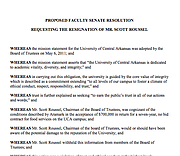Chattooga judge admits illegally charging fees
Thursday, September 12, 2013
VIDEO
This story is featured in today's TimesFreePress newscast.
SUMMERVILLE, Ga. - The Chattooga County State Court judge has announced that he no longer will take defendants' money for "court costs" in cases that are not being tried, an illegal practice that admittedly he has been doing for years.
Sam Finster said he made the decision Aug. 19 after a Chattanooga Times Free Press reporter showed him Georgia law that states charging "court costs" on such cases is illegal.
"After I talked with you," he said Tuesday, "I did some research."
Before the change, Finster and State Solicitor Sanford "Buddy" Hill said, this is how the process worked: If the arresting officer decided he didn't want the case tried, and the defendant agreed to pay court costs, Hill would present this agreement to Finster. This often happened when victims said that they would not help the prosecution.
If Finster approved, Hill would "nolle prosequi"-- decline to prosecute -- the case. In theory, Hill can reverse his decision at a later time.
In practice, however, what's commonly called a "nolle prosse" decision is essentially the same as a dismissal. But Hill would tell a defendant he or she had to pay a court cost. And, as the court's judge, Finster had final say on the agreement.
Charging such fees is "the proper thing to do," Finster said in August. "It's in the best interest of justice."
But it's illegal. According to Article 1, Section 1, Paragraph 14 of the Georgia Constitution, nobody can be forced to pay money in a criminal case unless that person has been convicted.
And, according to the Official Code of Georgia Annotated 15-13-35, a prosecutor cannot charge money on a case if the court did not find the defendant guilty.
"Under Georgia law, courts cannot demand court costs of criminal defendants whose cases are nolle prossed," said Sarah Geraghty, a senior attorney at the Southern Center for Human Rights. "The Georgia Constitution and Georgia Code expressly prohibit courts from collecting costs from a criminal defendant in the absence of the defendant's conviction."
In August, Hill said he did not know about this law: "I hadn't heard anything. I'm doing what the state court judge tells me to do."
Hill and Finster said demanding court costs in such cases saves the county money. When a sheriff's office deputy drives to the scene of a potential crime, taxpayers cover the cost of that trip. So when Hill decides not to prosecute a case, he said, the defendant should be the one footing the bill for that deputy's investigation.
But the cash flow does not work that way. A court cost falls under the county's "fees and forfeitures" category, and county officials split the money among several different funds. The court cost covers everything from jails to police officers' benefits and county employees' retirement packages.
Hill and Finster also said their practice helps a lot of defendants. If someone is found guilty of a crime, she could face fines and jail time. Paying a court cost in exchange for a clean record is not so bad, they said.
But that logic does not account for defendants who legitimately may be innocent. No one has proven their guilt, but they still have to give the court their money.
Jeff and Mae Bailey say this happened to them when they went to court Aug. 5. Jeff Bailey, 44, came to fight a simple battery charge. Mae, his wife and the alleged victim, came to tell Hill she would not help the prosecution.
The events surrounding Jeff Bailey's arrest on May 23 remain a mystery, but this much is for sure: He and Mae were ready to split up. Jeff rented a U-Haul; Mae rented space at a storage facility. The next day, they planned to move out of their Trion, Ga., home.
Then, for whatever reason, according to an arrest report, Jeff got angry. He walked over to Mae, grabbed her hair and pulled it. She yelled at him, begging him to stop. He refused.
Later, a Chattooga County sheriff's deputy showed up, handcuffed Jeff and charged him with simple battery.
Except for the arrest, though, Jeff says this never happened.
He says he went to bed in peace on May 23, prepared to leave his marriage behind. Then, around 11:45 p.m., he woke up to a knock on the front door and the sounds of an officer entering his house.
Looking back, Mae isn't so sure the assault ever happened either. She says she suffers from mental illness, though she doesn't know her exact diagnosis. She gets depressed. And she gets claustrophobic. And, sometimes, she sees her 17-year-old daughter, Brittany, who died in a car crash in 2004.
"I don't know how to explain it to you," she said. "I don't deal good with people."
The couple soon called off their divorce, and Mae wanted the charges dropped. Jeff says Hill told him the court would ignore the charges, assuming he could pay $270.
Jeff took the money from a $1,200 disability check Mae receives every month. They didn't suspect the charge might have been illegal.
Now, they say, they want their money back. They say $270 may not seem like much to some people, but to them it makes a big impact. The couple has moved to Calhoun, Ga., but Jeff continues to drive 80 miles to and from Trion for work at the Mount Vernon Mills cloth factory.
He makes only $9.33 an hour, but he needs the job. He said he can't find another one. Right now, he and Mae live off her disability check and the $330 he brings home every week.
"They screwed me over and were just money-hungry," he said.
Mae agreed: "That's like a week's worth of groceries and gas."
Finster said a situation like the Baileys got into won't happen again. He said the court won't charge money when it isn't allowed. He announced it from the bench Tuesday.
But records show that, just the day before, a man named Koran Dyer came to the Chattooga County State Court. He had been arrested in June on a charge of affray. On Monday, Hill agreed to nolle prosse the case.
Then, according to court records, Dyer paid $1,000.
Contact staff writer Tyler Jett at 423-757-6476 or at tjett@timesfreepress.com.


